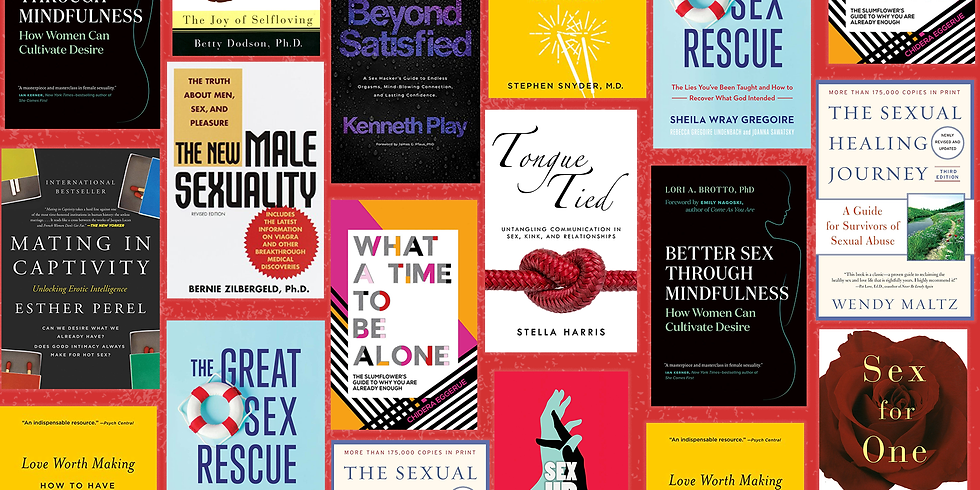A Physician’s Guide to a Fulfilling Sex Life in Midlife and Beyond
- Dr. Myriam Delgado, MD

- Jul 29, 2025
- 7 min read
Updated: Aug 2, 2025

A practical guide for older adults to navigate the natural evolution of their sexual lives by focusing on communication, adapting to physical changes, and fostering a deeper, more mature intimacy.
Takeaways
Emotional connection and confidence gained with age can lead to better sex.
Adapt to slower physical responses by allowing more time and using lubricants.
Maintain non-sexual affection like kissing and cuddling to preserve your bond.
Kegel exercises can improve sexual function and fitness for both partners.
Openly communicating your needs is the most important step you can take.
The Continuing Conversation: Navigating Intimacy Through Midlife and Beyond
Hello, I'm Dr. Myriam Delgado. One of the most delicate yet universal subjects that arises in my work at Biolife Health Center is the evolution of our sexual selves over time. It’s a conversation often shrouded in apprehension, as many people view the physical changes of aging as an inevitable end to a vibrant sex life. We notice our bodies respond differently than they did in our twenties or thirties, and it can be discouraging.
But I believe this view is incomplete. As a physician, I see the full picture. Yes, the body changes. Responses may become more subdued, and youthful intensity may give way to a gentler pace. However, aging bestows other, equally powerful gifts upon us: increased confidence, a greater capacity for communication, and often, a welcome shedding of youthful inhibitions. This emotional maturity can pave the way for a richer, more nuanced, and deeply satisfying form of intimacy.
The goal is not to chase the ghost of youthful sex, but to embrace the potential of later-life connection. This requires understanding the crucial physical and emotional elements at play. While medications and professional counseling are valuable resources, many common issues can be navigated with thoughtful adjustments. Let us explore some practical, supportive steps you can take to foster a fulfilling sexual life in this new chapter.
The Foundation: Opening the Lines of Communication and Knowledge

Before any physical act, intimacy begins with understanding and connection. Often, the greatest barrier we face is silence.
Educate Yourselves Together: The modern world offers a wealth of high-quality, accessible information. I encourage couples to explore self-help materials—be it from reputable websites, books, or health reports—that address their specific concerns. Think of it as studying a subject together. If speaking directly about certain topics feels too difficult at first, a wonderful technique is for each partner to underline passages in a book that they find meaningful and then share them with each other. It’s a gentle way to start a conversation without the pressure of finding the perfect words.
Share Your Inner World: Fantasies are not just for the young; they are a window into our desires at any age, especially when libido feels low. This doesn't need to be elaborate. It can be as simple as sharing a memory of a time you felt particularly connected or aroused, perhaps from a vacation or even a scene in a film. Writing these thoughts down first can help clarify them. This isn't about creating a script to perform; it's about sharing a part of your inner world, which is a profoundly intimate act in itself.
Adapting to the Body’s New Rhythm

Our bodies are like finely tuned instruments that require different handling over the years. Honoring this new rhythm, rather than fighting it, is key.
Give Yourselves the Gift of Time: As we age, our sexual responses naturally slow down. Arousal takes longer, and orgasm may require more sustained stimulation. Trying to rush the process often leads to frustration. I advise my patients to create a consciously interruption-free setting. This isn't just about logistics; it's a signal to each other that this time is valued. Accept that a longer, more leisurely pace is not a flaw, but the new, normal tempo.
Embrace Lubrication Freely: For many women, vaginal dryness beginning in perimenopause is one of the most immediate physical changes they notice. This is a direct result of lower estrogen levels, which reduces natural lubrication. Sex without adequate lubrication can be uncomfortable or even painful, a problem that can quickly snowball into avoidance, flagging desire, and relationship tension. Fortunately, this is often easily addressed. High-quality water-based or silicone-based lubricants should be seen as a normal and healthy part of sex, not as a sign of failure. Use them generously.
Maintain Physical Affection: It is essential to separate physical affection from the expectation of sex. When sexual issues cause stress, some couples stop touching altogether to avoid pressure. This is a mistake. Daily kissing, hugging, and cuddling maintain the vital emotional and physical bond that underpins your relationship. It ensures that your bodies remain in a comfortable, loving dialogue even when sex is challenging.
Practice Intentional Touching: Sex therapists often use a technique called "sensate focus," which is simply the practice of touching and exploring each other’s bodies without any goal of arousal or intercourse. You can practice variations of this at home. Take turns caressing each other, focusing on the sensations without any pressure for it to lead anywhere. A simple but effective exercise is to ask your partner to touch you in the way they would like to be touched. This gives you invaluable feedback on the type of pressure and movement they enjoy.
Strengthening the Body and Exploring Anew

Beyond accommodation, there are proactive steps you can take to improve sexual fitness and discover new avenues of pleasure.
Do Your Kegel Exercises: This is something I recommend for both men and women. The pelvic floor muscles form a hammock-like structure that supports the pelvic organs and plays a vital role in sexual function. Stronger muscles can increase sensation and, for women, orgasmic potential. For men, they can help with erectile function and ejaculatory control. The exercise is simple: tighten the muscle you would use to stop the flow of urine. Hold for three seconds, then release. Repeat 10 times, aiming for five sets throughout the day. The beauty is they can be done anywhere, discreetly.
Try Different Positions: Familiarity can sometimes lead to monotony. Exploring different sexual positions does more than just add novelty; it can help overcome physical problems. For example, a woman-on-top position gives her more control over the depth and rhythm of penetration, which can be helpful if certain movements are painful. For some women, entry from behind provides more direct stimulation to the G-spot, potentially aiding in orgasm.
Consider a Vibrator: These devices are not just solo toys; they can be wonderful additions to partnered sex. For many women, direct clitoral stimulation is the most reliable path to orgasm. A vibrator can provide this stimulation efficiently. It’s also an excellent tool for a woman to learn about her own body and then show her partner what feels good, guiding them to understand her needs better.
Summary: A Holistic Approach to Later-Life Intimacy
A fulfilling sex life in midlife and beyond is a realistic and achievable goal. It begins with the understanding that while youthful intensity fades, it can be replaced by a deeper, more emotionally resonant connection. By opening lines of communication, you and your partner can navigate this journey together.
Practical adjustments—like allowing more time for arousal, using lubricants, and exploring new positions—can solve many common physical hurdles. Proactive steps like Kegel exercises can improve sexual fitness, while maintaining non-sexual physical affection preserves the essential bond of your relationship. The key is to approach these changes not as a loss, but as an evolution.
Final Thought
As a physician, I want to emphasize that your sexual health is an integral part of your overall well-being. It is worthy of your attention and care. The journey of aging invites us to become more intentional in all aspects of our lives, and our intimate relationships are no exception. It asks us to communicate more deeply, to touch more thoughtfully, and to value connection over performance.
If you find that your own efforts are not enough, please do not give up hope. Discussing these issues with your doctor or a qualified sex therapist is a sign of profound strength and commitment to your health and your relationship. You deserve to experience a full, rich, and satisfying intimate life at every stage of life.
Frequently Asked Questions (FAQs)
How do common medications affect sex life as we age?
Many medications can impact sexual function. Antidepressants (especially SSRIs), blood pressure medications (like beta-blockers), and antihistamines can affect libido, arousal, or orgasm. It is very important to discuss these side effects with your doctor; sometimes, adjusting the dosage or switching to a different medication can help.
When should a couple consider seeing a sex therapist?
If sexual problems are causing significant distress, are persistent despite your own efforts, or are creating deep rifts in your relationship, it is a good time to see a sex therapist. They are trained to help couples navigate communication roadblocks and address both physical and psychological issues in a supportive environment.
What if one partner has a much higher desire than the other?
This is a very common issue. The key is open, non-blaming communication. The higher-desire partner needs to feel heard and not rejected, while the lower-desire partner needs to feel understood and not pressured. A therapist can help you find a middle ground that often involves expanding your definition of intimacy beyond intercourse to include other forms of connection and pleasure.
How can you start this conversation if you haven't talked about sex in years?
Choose a neutral time and place, not the bedroom. Start gently. You could say something like, "I was reading an article about how relationships change over time, and it made me think about us. I'd love to find some time to talk about how we can stay connected." Using an external prompt like an article can make it feel less like a direct criticism.
How does chronic illness, like heart disease or arthritis, impact sexuality?
Chronic illness can affect sexuality through pain, fatigue, medication side effects, or anxiety about triggering a health event. It’s vital to talk to your doctor about this. They can provide guidance on safe positions (for arthritis or back pain) or reassurance about the safety of sexual activity (after a heart attack), helping you regain confidence.
About Myriam Delgado, MD
Dr. Myriam Delgado is a compassionate physician with Biolife Health Center. She is dedicated to helping individuals understand and manage their health challenges. Dr. Delgado is committed to empowering her patients to live their best lives by providing supportive and practical guidance. Her work focuses on translating complex health findings into plain language, enabling people to make informed decisions.



